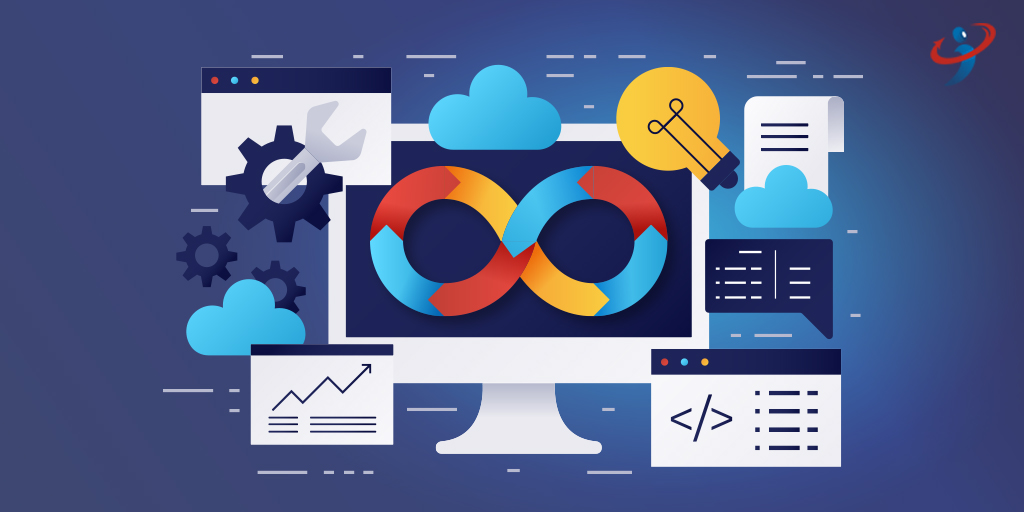Top 10 Monitoring Tools in DevOps

What does DevOps Monitoring mean?
DevOps is a method for tracking everything from strategy to development, integration to testing, and deployment to operations. It gives you a complete picture of the state of your production apps, services, and infrastructure in real time. Monitoring tools devops, applications and services require real-time streaming, historical replay, and visualization.
10 Major Monitoring Tools in DevOps
Here you will build more understanding of the top ten monitoring tools in DevOps.
- Librato
Librato allows you to track and understand the metrics that affect your business in real-time.Features:
• It provides several services that assist with data monitoring and visualization.
• It provides services that send notifications when activity processing is complete.
• No installation is required.
• The user interface is simple to use. - Sensu
Sensu is one of the top 10 DevOps tools for infrastructure and application monitoring. You can use this platform to track and measure the health of your infrastructure, apps, and business KPIs.
Features:
• It can dynamically register and de-register clients.
• It’s ideal for streamlining operations.
• It has excellent commercial support while being open-source. - PagerDuty
PagerDuty is an operations performance platform that collaborates closely with operations professionals to monitor app dependability and performance and address faults as soon as feasible.
Features:
• PagerDuty’s user-friendly alerting API has made it quite popular.
• It’s a strong graphical user interface for scheduling and escalation policies. - Datical deployment monitoring console
Under the top 10 cloud monitoring tools- The Datical deployment monitoring console is one of the best monitoring tools for DevOps, for automatically following each database’s deployment status across the organization.
Features:
• The simplified auditing of databases.
• It automatically keeps track of deployments and failures.
• It enables on-demand access to deployment data. - Tasktop integration hub
The Tasktop integration hub provides a one-stop solution for all software delivery integration needs, eliminating the need to use several tools.
Features:
• It enables the rapid integration of new tools into current software.
• You can use a filter to route artifacts and specific field updates according to customer requirements for frequency and direction.
• It uses a web-based interface to provide safe login. - Prometheus
Prometheus is a vibrant community-driven open-source system monitoring and alerting solution.
Features:
• It can collect time-series data for your company and link to PagerDuty.
• It is free of dependencies and provides a Web API for custom development. - Kibana
Kibana is an open-source analytics and visualization tool designed specifically for use with Elasticsearch. Searching, visualizing, and interacting with data stored internally in Elasticsearch indices are the most typical uses of Kibana.
Features:
• It includes a simple and quick setup procedure.
• You can examine the data in the log to find solutions to your production problems.
• It has an auto-highlighting option for the search boxes, so you can rapidly spot problems in your log files. - Splunk
Splunk has saved its place among the top 10 monitoring tools. Splunk is a web-based tool for searching, monitoring, and analyzing machine-generated data.
Features:
• It allows you to examine data from networks, servers, and apps.
• It’s simple enough to use in a production setting.
• It indexes data in such a way that it generates insightful analytics. - Nagios
Nagios can help monitor systems, applications, services, and business processes in a DevOps environment.
Features:
• It is an excellent product that can perform rapid tests and is simple to configure on both the client and server sides.
• You can create custom plug-ins to meet your needs. - App Dynamics
AppDynamics is a continuous monitoring platform for cloud and on-premises computing systems that provides infrastructure, network, and application monitoring.
Features:
• AppDynamics works with a variety of communication platform development, including Microsoft Azure, IBM, Kubernetes, AWS, and others.
• Machine learning-driven instant root cause diagnostics
• It operates on a pay-per-use basis.
• It’s simple to keep track of a hybrid environment.
I hope you get a good understanding of monitoring tool in DevOps from this blog.